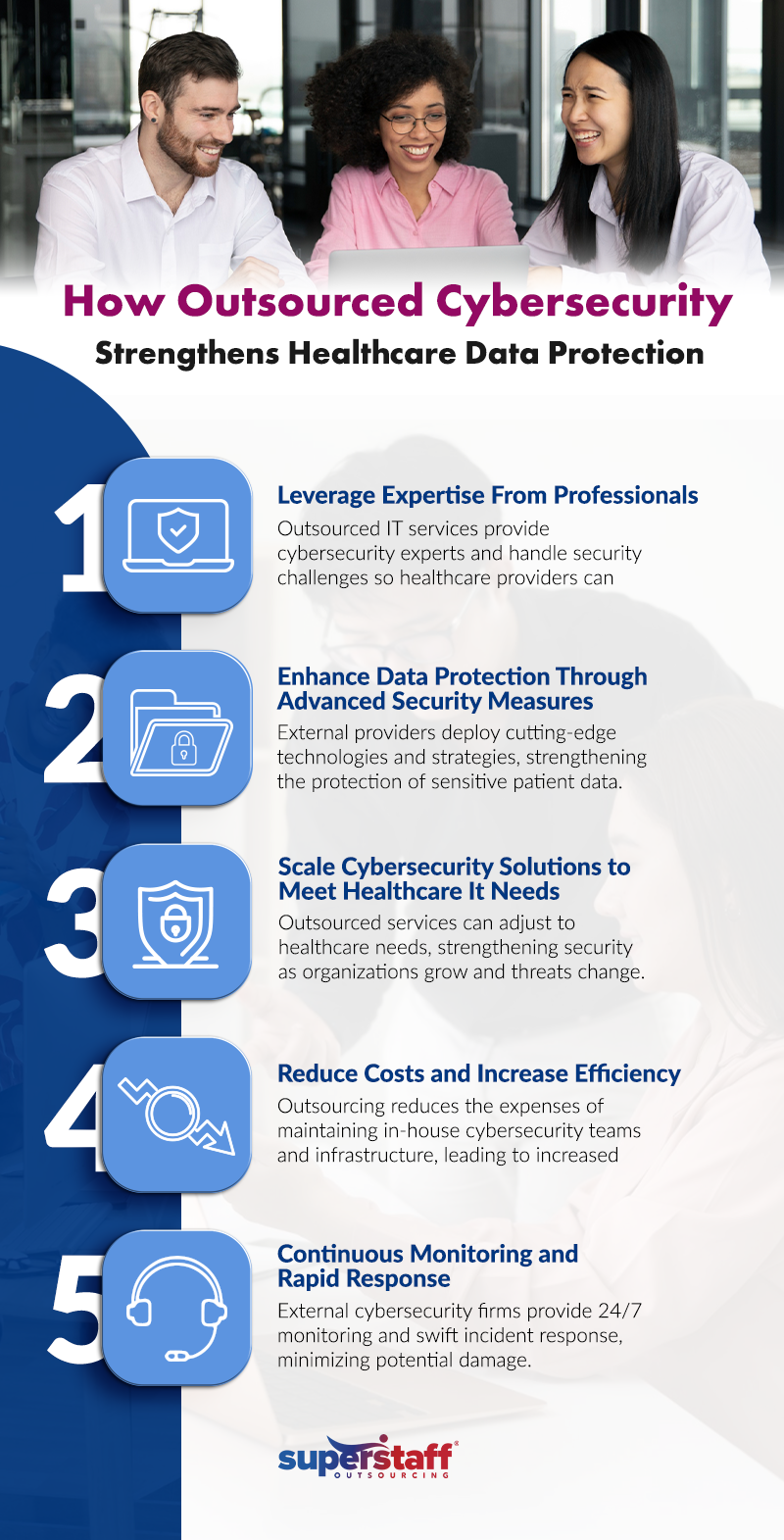
Healthcare faces a growing threat from cyberattacks, making the protection of patient data more critical than ever. In 2024 alone, nearly half the country had their data compromised. Just 13 breaches exposed the personal information of 146.5 million people—that’s 42% of the U.S. population. Why is healthcare such a prime target?
Unlike credit card numbers, which you can quickly cancel, patient data holds a treasure trove of personal details—supply chain logistics, insurance data, treatment history, and Social Security numbers. Hackers exploit this information for identity theft, fraudulent billing, and even blackmail, making patient data one of the most valuable commodities on the dark web.
Healthcare organizations also face strict regulations like the Health Insurance Portability and Accountability Act (HIPAA) and the General Data Protection Regulation (GDPR). With cyber threats constantly evolving, staying ahead of risks becomes even more challenging.
Given these challenges, outsourcing cybersecurity to specialized providers is a viable solution—offering healthcare IT services and scalable strategies tailored to protect sensitive data. This way, you can focus on your primary mission—delivering quality patient care.
Healthcare Cybersecurity Risks and Compliance Challenges
Healthcare organizations face many cybersecurity risks and compliance challenges. Understanding these threats and regulations can help safeguard patient data—and maintain trust.
Prevalent Cyber Threats in Healthcare
Cybercriminals increasingly target healthcare institutions due to the sensitive nature of the data they handle. The most common cyber threats include:
- Data breaches: From 2019 to 2023, the healthcare industry held the top spot for data breaches. Over 800 compromises (data breaches, exposures, and leaks) happened in 2023 alone.
- Ransomware: In 2024, ransomware attacks shut down 389 U.S. healthcare institutions, causing delays in medical procedures and compromising patient care.
- Insider threats: The severity of incidents involving employee errors, negligence, or malicious intent has increased, with 71% of companies reporting up to 20-40+ incidents yearly.
- Exploitation of vulnerabilities: In 2024, 63% of known exploited vulnerabilities tracked by Cybersecurity and Infrastructure Security Agency (CISA) were found on healthcare networks, highlighting the urgent need for stronger security measures.
Navigating Healthcare Data Protection Laws and Compliance Requirements
Compliance with data protection regulations is a vital aspect of healthcare cybersecurity. Key frameworks include:
- Health Insurance Portability and Accountability Act (HIPAA): In the States, HIPAA sets national electronic health records (EHR) standards. Non-compliance can result in fines reaching from $100 to $50,000 per affected record, with a maximum annual penalty of $1.5 million per violation.
- General Data Protection Regulation (GDPR): The GDPR enforces strict data protection measures for international healthcare organizations handling patient data from the European Union. Non-compliance can result in penalties of up to €20 million or 4% of annual global turnover, whichever is higher.
- Philippine Data Privacy Act (DPA) of 2012: Local hospitals and clinics in the Philippines must adhere to the DPA. Penalties for unauthorized processing of personal data fines breaches from PHP 500,000 to PHP 2,000,000 and imprisonment of up to three years.
How Outsourced Cybersecurity Strengthens Healthcare Data Protection
Healthcare IT outsourcing offers organizations a strategic approach to safeguarding patient data and maintaining compliance. Key advantages include:
1. Leverage Expertise From Professionals
Partnering with IT services for the healthcare industry gives organizations access to experts who stay ahead of cyber threats. This allows healthcare providers to focus on patient care while nearshore call centers handle complex security challenges.
Think of it as hiring a specialist rather than relying on a generalist. Cybersecurity professionals live and breathe threat detection, compliance protocols, and data protection. They constantly update their playbook to match hackers’ evolving tactics.
When you outsource to a trusted provider, you’re not just getting an extra set of hands—you’re gaining a team that knows how to block threats before they happen. That level of expertise can be the difference between business as usual and a full-blown data crisis.
2. Enhance Data Protection Through Advanced Security Measures
External healthcare IT solutions employ cutting-edge technologies and methodologies to safeguard sensitive information.
Implementing advanced security measures through back-office service solutions, such as encryption, intrusion detection systems, and multi-factor authentication, reduces the risk of data breaches. This method ensures that patient data remains confidential and secure.
3. Scale Cybersecurity Solutions to Meet Healthcare IT Needs
Outsourced healthcare IT systems offer scalability so that healthcare organizations can adjust security measures accordingly. This flexibility means that security protocols can grow or adapt to organizational changes, maintaining robust protection without overextending resources.
Let’s say your facility is expanding, adding new locations, or rolling out a telehealth program—your security needs will naturally evolve. Outsourced providers make it easy to scale up protection without building everything from scratch or overwhelming your in-house team.
Whether dealing with a sudden spike in patient data or adopting new digital tools, your cybersecurity setup can grow with you. It’s like having a flexible, ready-to-deploy security net that adjusts as your operations do—so you’re always protected, no matter how fast your organization moves.
4. Reduce Costs and Increase Efficiency
Managing an in-house cybersecurity team is costly and resource-intensive. Specialized call centers help cut staffing, training, and infrastructure costs while providing multilingual customer service for global operations.
Consider the expenses of hiring full-time cybersecurity staff—competitive salaries, ongoing certifications, software licenses, and hardware upgrades—they add up fast. By outsourcing, you skip the overhead and still get access to top-tier security talent and technology.
Many outsourced providers offer multilingual support, a massive bonus if you’re operating across different regions or serving a diverse patient base. You’re not just saving money—you’re running a leaner, more innovative operation without sacrificing quality or security.
5. Continuous Monitoring and Rapid Response
External cybersecurity firms provide 24/7 monitoring and swift incident response capabilities, reducing damage and downtime. This proactive approach is vital in healthcare, where data breaches can have serious consequences.
Cyber threats don’t keep office hours, and neither should your security. With outsourced cybersecurity, monitoring is constant—day, night, weekends, and holidays. The moment a potential threat appears, experts are ready to act. That speed is crucial in healthcare, where even a short delay can disrupt care or expose sensitive information.
A dedicated team on watch ensures issues are caught early and handled fast, minimizing impact and helping your organization stay one step ahead.
Fortify Your Company’s Immunity
Healthcare organizations face escalating cyber threats that jeopardize patient data and trust, and with cyber hackers becoming smarter, there’s no better time to invest in expert security than now.
Outsourcing cybersecurity emerges as a strategic solution to get specialized expertise, advanced security technologies, and scalable services tailored to the healthcare sector’s unique challenges.
Partnering with a trusted cybersecurity provider and customer service outsourcing in the Philippines is the first step to safeguarding your organization and maintaining the highest standards of patient confidentiality.
Outsource to the Philippines and protect your information today with SuperStaff. Visit our Contact Us page to see how we can assist in managing your healthcare IT cybersecurity needs.







